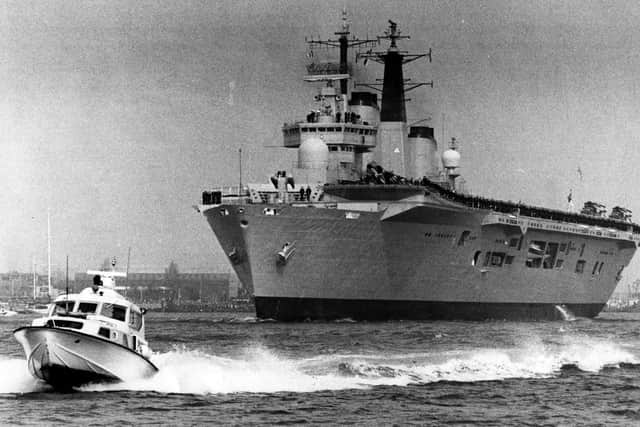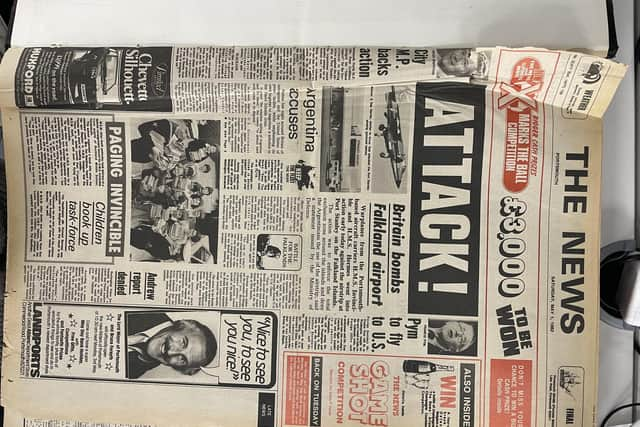Falklands 40: Headlines from The News, Portsmouth on May 1, 1982
and live on Freeview channel 276
Attack! Britain bombs Falkland airport
Warplanes from the Portsmouth-based aircraft carriers HMS Invincible and HMS Hermes went into action today against the airstrip at Port Stanley on the Falkland Islands.
The action was to enforce the total exclusion zone around the islands and deny the Argentinians the use of the airstrip, said a statement issued by the Ministry of Defence.


Advertisement
Hide AdAdvertisement
Hide AdThe Defence Ministry announcement appears to indicate that Royal Navy Sea Harrier jump jets bombed the 4,000ft runway at the airfield, two-and-a-half miles from the Falklands capital.
They are also likely to have strafed any Argentinian aircraft parked there with their twin 20-shots-a-second, 30mm. cannon.
Argentina’s ruling military junta said later anti-aircraft artillery repelled the Harrier attack.
The communique did not say whether any British jets were hit or if any hits were scored against the airstrip.


Advertisement
Hide AdAdvertisement
Hide AdThe aim of today’s action would have been to crater the runway to prevent any landings or takeoffs - a vital pre-requisite for any British task force commander planning an invasion.
Previous reports indicated the presence of Mirage fighter jets, Hercules transport planes, and Pucara ground attack aircraft at the airfield.
It is not known whether the British forces attacked fuel and ammunition dumps around the airstrip.
The action by the British force appears to have been carried out in darkness - dawn in the Falklands breaks about noon British Summer Time.
Advertisement
Hide AdAdvertisement
Hide AdOne question mark surrounds the use of the anti-aircraft weapons the Argentinians were supposed to have installed.
Reports from Buenos Aires indicated that the British-designed Tigercat missile system had been installed.
Argentina accuses
Argentina last night accused Britain of intransigence and the United States of pressure tactics, while emphasizing its own willingness to negotiate a solution to the Falklands Islands crisis.
It predicted ‘the senseless spilling of Argentine and British blood’, but vowed ‘to defend itself with all means at its disposal’.
Advertisement
Hide AdAdvertisement
Hide AdIn a statement, Interior Minister General Alfredo Saint Jean said US Secretary of State Alexander Haig had proposed an accord ‘that would adequately contemplate the diverse aspects of UN Security Council Resolution 502’.
City MP backs action
Portsmouth North MP (Mr Peter Griffiths) pledged his ‘fullest support’ for the government in taking action against the air-strip at Port Stanley.
‘The Argentinians cannot possibly mistake our intentions now,’ he said.
‘While no one welcomes the fact that we have got to the stage of military action in the sense of casualties and damage, I am fully in support of this attack.’
Advertisement
Hide AdAdvertisement
Hide AdMr Griffiths said the action was essential to achieve a long-term diplomatic solution. It was also necessary for the protection of the British Fleet.
In other news – Olympic style opening
Havant’s Olympic Day volleyball extravaganza takes off at the leisure centre on Monday - and it will be opened in true Olympian style.
Performing the opening and closing ceremonies will be Mr. Alfred Chaffer, a Havant man who formed part of the team which carried the Olympic torch - a symbol of international unity - for the 1948 Olympic Games in London.
Mr Chaffer, 66, of Elmfield Road, Havant, ran a two-mile leg along the Basingstoke road carrying the Olympic torch in 1948. He was a renowned Hampshire sprinter before and after World War II.